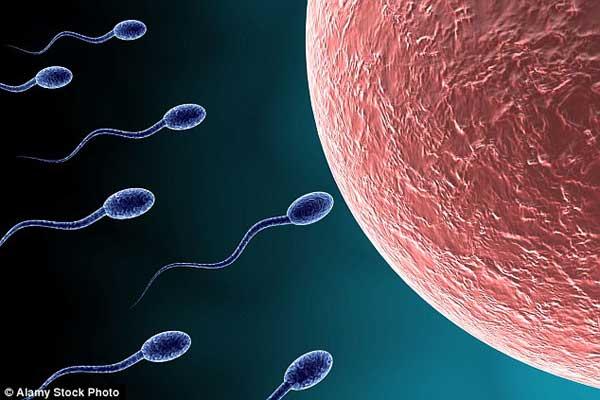[摘要]英国科学家在男性避孕药研发上有了重大突破,借药物让精子无法“游泳”,使男性暂时不孕,这可能改变千千万万伴侣的性生活。以后不仅女人可以吃避孕药,连男人都有避孕药可以吃了!
英国科学家在男性避孕药研发上有了重大突破,借药物让精子无法“游泳”,使男性暂时不孕,这可能改变千千万万伴侣的性生活。以后不仅女人可以吃避孕药,连男人都有避孕药可以吃了!

British scientists have made a breakthrough in the search for a male contraceptive pill which could transform the sex lives of millions of couples.
英国科学家在男性避孕药方面实现重大突破,将改变数百万夫妇的性生活。
For decades, researchers have tried to produce a reliable alternative to condoms or a vasectomy, but there has been little progress.
几十年来,科研人员一直在尝试能够替代避孕套和输精管切除的可靠方法,但收效甚微。
Now UK scientists have found the secret of making men temporarily infertile by switching off sperms ability to swim.
现在终于有英国科学家发现,通过阻断精子的游动能力能够让男性临时性不育。
They have made tiny designer compounds which smuggle themselves into sperm, and stop their tails from wiggling.
“他们研制出的微型‘设计合成物’能够偷偷潜入精子内,阻止精子尾部摆动。
If a sperm can't swim, it has no chance of naturally fertilising a woman's egg.
“如果精子不能游动,自然就没有机会与卵细胞结合。
The breakthrough made by British scientists could be the key to rendering men temporarily infertile.
英国科学家的这项突破将开启使男性暂时性不育的大门。
It might become possible for them to pop a pill that stops their sperm from swimming.
未来男性有可能通过口服阻止精子游动的药丸来达到避孕效果。
The key advance raises the prospect of a fast-acting pill or a nasal spray that a man could take hours or perhaps just minutes before sex.
这一关键性进步使人们有望研制出速效药丸或鼻用喷雾,男性只需在性生活前几小时甚至几分钟使用即可达到避孕目的。
Researchers believe its effects would wear off within days, meaning he would again be fertile.
研究人员认为药效仅会持续几天时间,几天后男性将再次恢复生育能力。
By contrast, women are typically advised to stop taking the Pill weeks or even months before trying to conceive.
相比之下,如果女性想恢复生育能力,就必须要在数星期甚至数月前停止服用药物。
Last night, family planning experts said a reversible male contraceptive could benefit millions of couples where the woman cannot take the Pill for medical reasons.
昨晚,计划生育专家们称,可逆的男性避孕药将造福数百万由于医疗原因妻子无法服用避孕药的夫妇。
And it would save men from being trapped into having children they did not want, they added.
此外,这还能够解救那些不想要孩子却受到诱骗的男性。
With global sales of contraceptives topping 13 billion a year, the market for a reversible male contraceptive could be huge, but some cast doubt on the idea of a male pill, doubting women will trust men to take it.
鉴于每年避孕药的全球销售额高达130亿英镑,可逆的男性避孕药的市场前景也将相当可观,但也有些人对男性避孕药提出质疑,怀疑女性是否会信任由男性服用避孕药。
Lead researcher Professor John Howl, of Wolverhampton University, last night described how effective their sperm-stopping agent had been in lab tests.
昨晚,伍尔弗汉普顿大学首席研究员约翰 豪尔教授描述了阻碍精子游动的药剂在实验室试验的效果。
He said: "The results are startling and almost instant."
他说:“结果令人相当震惊——药剂几乎是即时生效。
When you take healthy sperm and add our compound, within a few minutes the sperm basically cannot move. Male infertility is often the result of poorly moving sperm, called low motility.
将合成物放入健康的精子后,仅不到几分钟时间,精子基本就无法动弹。男性不育常常是因为精子活力低,即“弱精”。
Using this, the Wolverhampton team, together with Portuguese researchers, made a compound called a cell-penetrating peptide, which gets inside sperm and brings them to a standstill.
利用这一点,伍尔弗汉普顿研究团队与葡萄牙研究人员共同研制出了一种名为细胞穿透肽的合成物,此合成物能够进入精子体内,阻止精子游动。
Prof Howl said: "This is a totally unique approach nobody else has ever done this before. Peptides are short chains of amino acids that can influence how human cells work."
豪尔教授说:“这是一种非常独特的研究方式,此前还没有人这样做过。”肽是影响人体细胞功能的氨基酸短链。
They occur naturally but biochemists can make synthetic versions.
它既能自然合成,也可通过生物化学家人工合成。
Prof Howl and colleague Dr Sarah Jones first demonstrated that certain cell-penetrating peptides could smuggle themselves inside sperm cells, like a Trojan horse.
豪尔教授和同事萨拉 琼斯博士最先证明某种“细胞穿透肽”能够像特洛伊木马一样将自己偷运进精子细胞。
Then they joined forces with IVF experts at Aveiro University in Portugal, who had identified the crucial protein responsible for putting the wiggle into sperm tails.
后来,他们与葡萄牙阿威罗大学的生殖专家合作,后者已确认驱动精子尾部摆动的关键蛋白质。
The two universities created a bespoke peptide which turns that protein off.
两所大学共同研制出一种特定的肽,能够使此蛋白质失去作用。
They tested the approach in the petri dish on bovine and human sperm, with similarly impressive results, and will soon publish their results.
他们将此合成物放入含有牛和人精子的培养皿内进行试验,结果竟惊人的相似。他们表示将尽快公布实验结果。
Prof Howl said they hoped to start live animal tests in two to three years, thanks in part to a 175,000 Portuguese grant.
豪尔教授说他们希望利用葡萄牙资助的17.5万英镑,在未来2到3年内进行活体动物实验。



